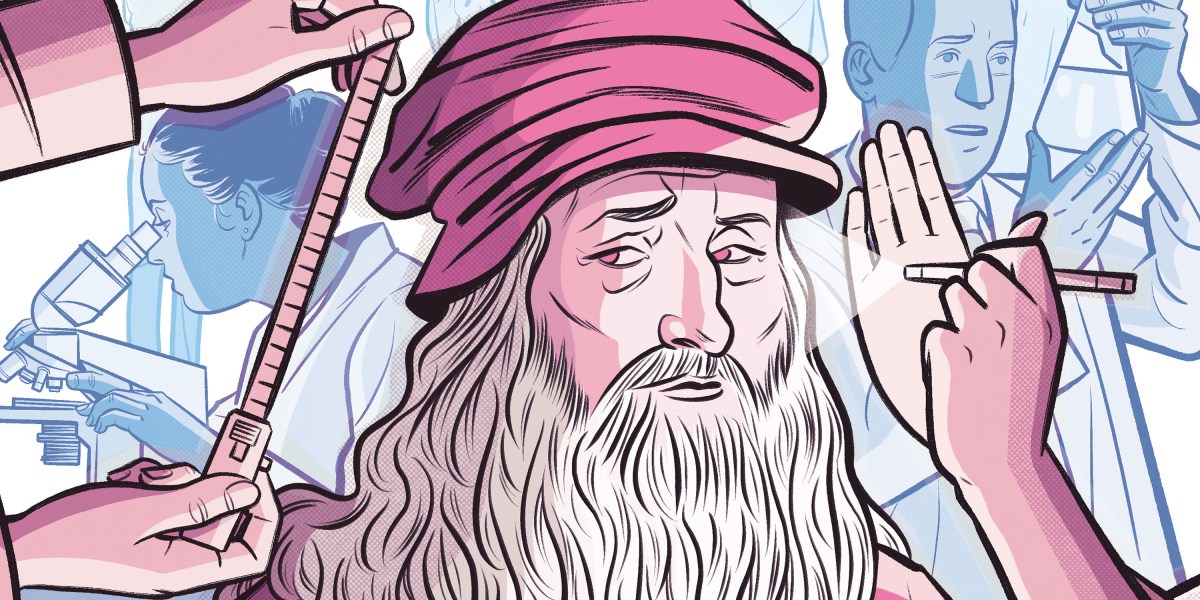This is today’s edition of The Download, our weekday newsletter that provides a daily dose of what’s going on in the world of technology.
These are the best ways to measure your body fat
—Jessica Hamzelou
We all know that being overweight is not great for your health—it’s linked to metabolic diseases like diabetes and cardiovascular problems. But weighing yourself won’t tell you all you need to know about your disease risk.
A friend of mine is a super-fit marathon runner. She’s all lean muscle. And yet according to her body mass index (BMI), which is a measure of weight relative to height, she’s overweight. Which is frankly ridiculous.
I, on the other hand, have never been all that muscular. I like to think I’m a healthy weight—but nurses in the past have advised me to eat more butter and doughnuts based on my BMI. This is advice I never expected to receive from a health professional. (I should add here that my friend and I are roughly the same height and wear the same size in clothes.)
The BMI is flawed. Luckily, there are several high-tech alternatives, but a simple measure that involves lying on your back could also tell you about how your body size might influence your health. Read the full story.
This story is from The Checkup, our weekly newsletter giving you the inside track on all things biotech and health. Sign up to receive it in your inbox every Thursday.
The US must do more to boost demand for carbon removal, observers warn
In 2022, the US made a massive bet on the carbon removal industry, committing $3.5 billion to build four major regional hubs in an effort to scale up the sector. But industry observers fear that market demand isn’t building fast enough to support it.
Some are now calling for the Department of Energy to redirect a portion of the money earmarked to build direct-air-capture (DAC) plants toward purchases of greenhouse-gas removal instead.
Breakthrough Energy, the Bill Gates–backed climate and clean energy organization, has released a commentary calling for more government support for demand to ensure that the industry doesn’t stall out in its infancy. Read more about what they have to say.
—James Temple
The must-reads
I’ve combed the internet to find you today’s most fun/important/scary/fascinating stories about technology.
1 Tesla has unveiled its Cybercab robotaxi
Elon Musk optimistically anticipates they’ll be available “before 2027.” (Tech Crunch)
+ He has a long history of overpromising and undelivering. (WP $)
+ Musk was vague on details, but claimed it would cost less than $30,000. (FT $)
2 Hurricane Milton has left millions of Florida residents without power
Thousands of people have been rescued from flooded areas. (WSJ $)
+ Luckily, satellite-connected smartphones can keep them connected. (WP $)
+ Meteorologists are receiving death threats amid storm misinformation. (Rolling Stone $)
3 The US and UK will work together to protect children online
The two countries are forming a working group to tackle sexual abuse and harassment. (BBC)
+ Popular gaming platform Roblox is failing to protect young users, a report claims. (FT $)
+ How to protect your child’s photos online. (The Guardian)
+ Child online safety laws will actually hurt kids, critics say. (MIT Technology Review)
4 China is spreading antisemitic claims ahead of the US election
Fake accounts are spreading dangerous conspiracy theories about politicians. (WP $)
+ US authorities fear Russia, China, Iran and Cuba will sow doubts about the results. (Reuters)
5 Big Pharma is fighting back against compounded weight loss drugs
Unbranded versions proliferated during a shortage of big-name drugs. Now, the largest companies want them gone. (Wired $)
6 Uber and Lyft exploited a legal loophole to avoid paying NY drivers
Drivers have reported being locked out of the app almost every hour. (Bloomberg $)
+ Uber’s facial recognition is locking Indian drivers out of their accounts. (MIT Technology Review)
7 Viral debate videos are inescapable online
The more competitive, theatrical, and unbalanced, the better. (Vox)
8 How Wikipedia editors are tackling the influx of AI trash content
They’re trying to defend the site from misleading, garbled AI articles. (404 Media)
+ AI trained on AI garbage spits out AI garbage. (MIT Technology Review)
9 How to make the ocean quieter
Thanks to flexible propellers and noise-dampening metamaterials. (Economist $)
10 This social app allows Gen Z to filter out tell-tale red Solo cups
To maintain a squeaky clean online image. (TechCrunch)
Quote of the day
“As usual, Elon Musk is trying to compete in the Tour de France on a tricycle.”
—Dan O’Dowd, billionaire co-founder of Green Hills Software and founder of the software safety Dawn Project group, was left unimpressed by Tesla’s cybercab event, he tells Rolling Stone.
The big story
People are worried that AI will take everyone’s jobs. We’ve been here before.
January 2024
It was 1938, and the pain of the Great Depression was still very real. Unemployment in the US was around 20%. New machinery was transforming factories and farms, and everyone was worried about jobs.
Were the impressive technological achievements that were making life easier for many also destroying jobs and wreaking havoc on the economy? To make sense of it all, Karl T. Compton, the president of MIT from 1930 to 1948 and one of the leading scientists of the day, wrote in the December 1938 issue of this publication about the “Bogey of Technological Unemployment.”
His essay concisely framed the debate over jobs and technical progress in a way that remains relevant, especially given today’s fears over the impact of artificial intelligence. It’s a worthwhile reminder that worries over the future of jobs are not new and are best addressed by applying an understanding of economics, rather than conjuring up genies and monsters. Read the full story.
—David Rotman
We can still have nice things
A place for comfort, fun and distraction to brighten up your day. (Got any ideas? Drop me a line or tweet ’em at me.)
+ Marty the robot is a Boston icon, rolling up and down Stop & Shop’s aisles without complaining.
+ Punctuation really matters—a simple comma cost these companies millions!
+ Cool: these pumpkins are thriving in Bangladesh sandbars.
+ For all our Warhammer heads out there: there’s only one shade of green that matters.




